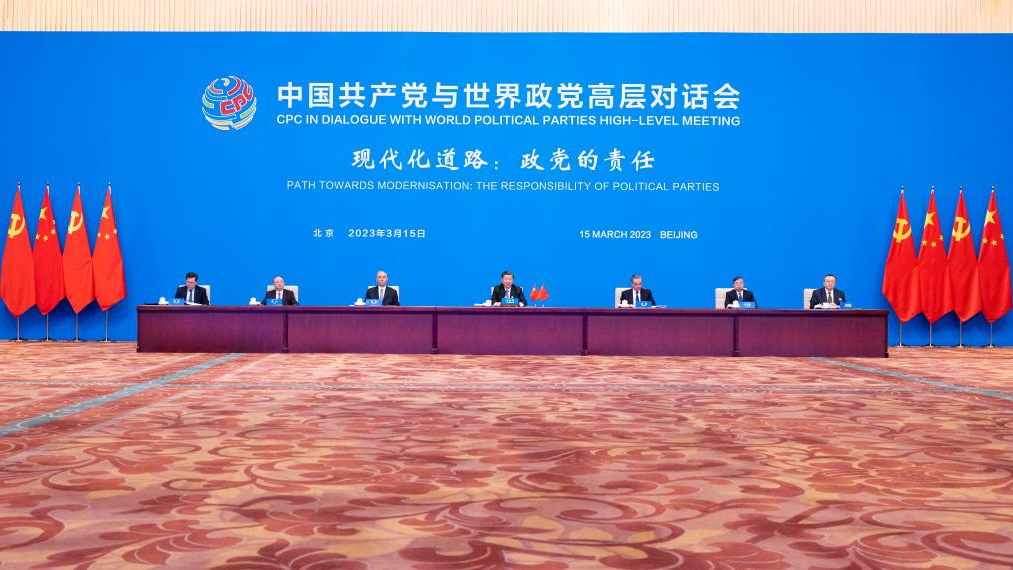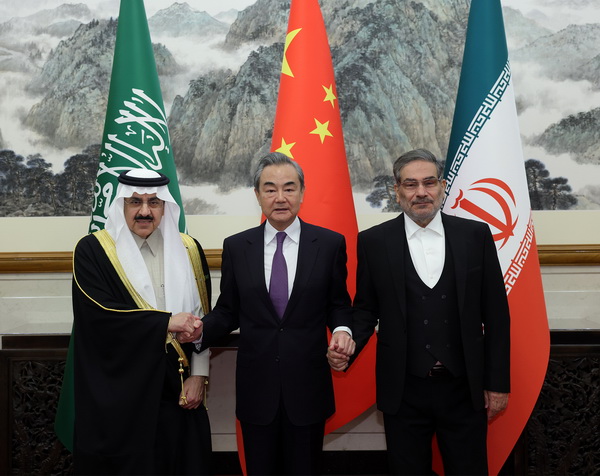
Xi Jinping, general secretary of the Communist Party of China (CPC) Central Committee and Chinese president, attends the CPC in Dialogue with World Political Parties High-Level Meeting via video link and delivers a keynote address in Beijing, capital of China, March 15, 2023. /Xinhua
Xi Jinping, general secretary of the Communist Party of China (CPC) Central Committee and Chinese president, attends the CPC in Dialogue with World Political Parties High-Level Meeting via video link and delivers a keynote address in Beijing, capital of China, March 15, 2023. /Xinhua
Editor's note: Hamzah Rifaat Hussain, a former visiting fellow at the Stimson Center in Washington and former assistant researcher at the Islamabad Policy Research Institute, is a TV anchor at Indus News in Pakistan. The article reflects the author's opinions and not necessarily those of CGTN.
Xi Jinping, general secretary of the Communist Party of China (CPC) Central Committee, proposed the Global Civilization Initiative (GCI) for the international community at the CPC in Dialogue with World Political Parties High-Level Meeting on March 15. In his keynote address, he spoke about how tolerance and mutual learning between different civilizations play an indispensable role in advancing global modernization. The proposed GCI demonstrates China's commitment to global peace and harmony with a people-centric approach to eschew estrangement, hegemony and ideological confrontation for a just and equitable world order.
The central tenets of the GCI articulated by Xi, also Chinese president, addresses the core fundamentals of regressive trends that are plaguing the world today. The existence of polarization, nativism and intolerance in countries both domestically and in international relations necessitates dialogue, deliberations and solutions which is only possible through inclusiveness among civilizations. Interactions can mitigate structural racism, abuse of power and the rise of right-wing forces in political spectrums across the world, which is contributing to a decline in a true democracy.
According to the Global State of Democracy Initiative report titled, "Forging Social Contracts in a Time of Discontent," 46 percent of democracies in Europe are witnessing an erosion of social contracts. The credibility of election results has been questioned alongside youth disillusionment with political parties and corruption. The global realities are threatening principles of equality, inclusiveness and dialogue among civilizations. It's critical for countries to conduct cross cultural exchanges to foster better understandings between communities, governments and civil societies to offset spoilers.
Additionally, President Xi spoke about respecting and promoting justice, true democracy and freedom for all concerned. This entails an understanding that a 'one-size-fits-all' approach on political systems across the world is untenable. Different countries with diverse systems and civilizations have different understandings of governance, economic development and people-centric policies, which must be respected. The imposition of hegemonic designs on another sovereign UN member state will only sow discord and lead to trust deficits, which are detrimental to civilizational contact. It's important to respect, tolerate and understand a country's unique circumstances and institutional frameworks for greater collaboration.
Each country also has its unique history and historical experiences. A rich diversity of culture, customs, norms, belief systems and values continue to define the world, which needs to be harnessed. China's historical experiences with Western imperialism and its focus on combining socialist ideology with free enterprise differ from other states, yet such experiences can foster goodwill between different states.

Wang Yi (M), Musaad bin Mohammed Al-Aiban (L) and Ali Shamkhani pose for photo in Beijing, China, March 10, 2023. /Chinese Foreign Ministry
Wang Yi (M), Musaad bin Mohammed Al-Aiban (L) and Ali Shamkhani pose for photo in Beijing, China, March 10, 2023. /Chinese Foreign Ministry
On ideology, it's important to manage differences between states. Note that China's ability to initiate a breakthrough and thaw relations between the diametrically opposed Saudi Arabia and Iran in the Middle East was due to diplomacy anchored by respecting belief systems and values that both countries hold in high regard, instead of downgrading one state at the expense of the other. The result has proven rewarding as after decades of hostilities both Riyadh and Tehran established closer diplomatic relations. Through cross cultural contacts, the ability to understand perspectives and build bridges is possible for a more synergized world order.
Central to such efforts are the roles of political parties. President Xi said the CPC is ready to cooperate with political parties in other countries to develop a novel style of international relations that have a trickle-down effect on populations worldwide and strategic partnerships. In the video meeting, President Xi spoke about China's modernization and considered such efforts to not be an "exclusive patent" of a selected group of countries but a process whereby a country follows general laws governing it in light of its national conditions, stages of development and notable features.
The results have proven to be fruitful for China and the developing world. According to professor Evandro Menezes de Carvalho from the Brazil-China Studies Center of the Getulio Vargas Foundation, China's modernization that features material and spiritual civilizations highlights the goal of achieving shared prosperity for all and promoting social fairness and justice. This injects more positive energy into improving global governance alongside cultural-ethnical advancement that broadens the channels for deeper understandings between China and the rest of the world, according to Professor Ibrahim Alluhayb from the King Saud University.
Accordingly, President Xi's proposed Global Civilization Initiative will promote a more just, equitable and prosperous world order.
(If you want to contribute and have specific expertise, please contact us at opinions@cgtn.com. Follow @thouse_opinions on Twitter to discover the latest commentaries on CGTN Opinion Section.)